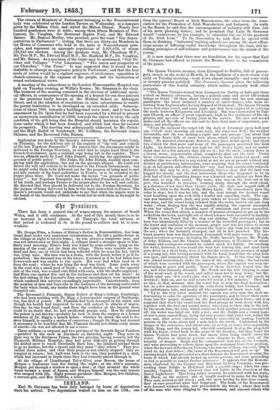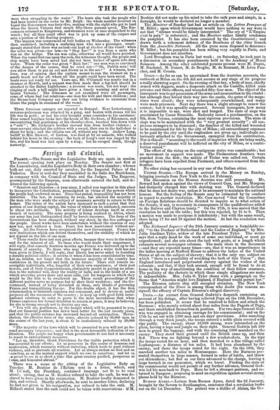IRELAND.
Earl St. Germans has been duly besieged by hosts of deputations ohm his arrival. Two deputations waited on him on the 1 lth ; one from the (parent) Board of Irish Manufacture, the other from the Asso- ciation for the Promotion of Irish Manufacture and Industry. In reply to the Board, he said that the encouragement of industry will form one of his most pleasing duties ; and he promised that Lady St. Germans would "endeavour, by her example, to stimulate the use of the products of the Irish loom." To the Association he said, that he agreed with them in thinking "industrial training-schools are among the most effica- cious means of diffusing useful knowledge throughout the land, and in- stilling principles of self-reliance and perseverance into the minds of the young.'
It is now stated that there was no foundation for the report that Earl St. Germans had offered to restore the Messrs. Beers to the commission of the peace.
The Queen Victoria steamer, from Liverpool to Dublin, full of passen- gers, struck on the rocks at Howth, in the darkness of a snow-storm very early on Tuesday morning—went down almost instantly—and some sixty or seventy persona perished. The Freetnan's Journal gives the following particulars of this fearful calamity, which tallies generally with other accounts.
"The Queen Victoria started from Liverpool for Dublin at half-past three o'clock on Monday afternoon, having a general cargo and about 120 human beings on board. Of these about twelve were cabin and the rest steerage passengers : the latter included a number of cattle-dealers, who were re- turning from England after having disposed of their stook. The Queen Victoria was a first-class vessel, and some years ago had been employed in carrying the mails between Kingstown and Liverpool. She was commanded by Cap- tain Church, an officer of great experience, high in the confidence of his em- ployers, and upwards of twenty years in the service. The first and second mates and all the officers are also said to have been men of experience, pru- dence, and intelligence.
"From the moment the vessel left the dock at Liverpool up to half-past one o'clock next morning all went well; the wind was N.E., the weather favourable, and she was making a rapid and easy passage : but about that hour some heavy falls of anew took place, which retarded her progress a little. No material abatement, however, took place in her speed ; and about two o'clock the first mate and some of the passengers perceived the Kish Light. An anxious look-out was kept for the Bailey Light, and we under- stand that for a few minutes they did see it ; but the snow, coming down in a heavy, dense, impenetrable cloud, completely shut out the view. Under these circumstances, the obvious course was to have slackened speed ; and whether this was effected to any extent or not we are at present without any distinct or satisfactory information, some asserting that the vessel continued to go at full speed, and others that her way' had been considerably reduced. However this may be, it is, unfortunately, but too clear that the land was hugged too closely, and the first intimation those who happened to be OIL deck had of their impending danger was a hurried and agitated cry from the first mate to stop the vessel. The mate, who was on the look-out at his post, was horrified to perceive, looming dimly through the snow-cloud, at a distance of not more than twenty yards, the dark and rugged cliffs of Howth, a little to the North of the Bailey Light. He immediately gave the order to stop ; but it was too late, and the next instant the doomed vessel went headlong upon the rock with a fearful and appalling crash. The cap- tain was instantly upon deck, and gave orders to reverse the engines : this was done, and the vessel being released from the rocks, backed out into deep water ; when, finding that she was rapidly sinking, the captain attempted to run her ashore." A dreadful scene of confusion and terror succeeded. When the vessel first struck, a number of persons attempted to get on to the rocks from the bows, and eight out of about a dozen were successful in landing.
When it was found that the ship was sinking, "the starboard quarter- boat was immediately filled by a number of the wretched passengers ; but in the hurry and confusion of the moment, proper care was not taken to secure the ropes, and the great weight caused the boat to slip from her davits into the sea ; when she instantly swamped, and all in her perished. The lar- board quarter boat was then lowered' fortunately with more success. It con- tained seventeen persons ; including Mr. Duffy, Queen's Square, Mr. Walsh, of Athy, Kildare, and Mr. Charles Ralph, shipowner, of Wicklow—of whose humane and courageous conduct we cannot speak MO highly. On reaching the water, however, it was found the boat was leaking fast, and must have gone down in a short time, were it not for the coolness and presence of mind of a young lad, who having searched with his hand, found that the plug-hole was open, and immediately thrust his fingers into it. At this time the boat was almost immediately under the sides of the sinking ship ; the bulwarks of which were crowded with the passengers, whom the captain was seen en- deavouring to quiet and pacify. Some of them, however, leaped into the sea, and were instantly drowned. Mr. Walsh saw his wife clinging to some of the wood-work of the vessel, and called upon her to leap down ; but Mr. Ralph cried out, For siod's sake don't jump down, or you will surely be drowned; hold on, and we will return for you in a few minutes.' They had no idea at that moment that the vessel was so near her final destruction : but in a few minutes afterwards she went down bodily, bow foremost ; and the unfortunate lady, and nearly all who remained on board, were lost. "Up to the very latest moment the captain was seen upon the deck en- deavouring to calm the agitation of the passengers, and to direct their exer- tions into the proper channel for the preservation of their lives ; and it is supposed that when the vessel took her final plunge he went down with her, together with the first and second mates, who clung to their ship to the last. In the mean time, the boat, which could not hold another person, was shoved off; the water was baled out with a hat; and Mr. Ralph and a young man- of-war's-man named Kegg, being the only persons that could row, seized the oars, and, after severe exertion, ultimately succeeded in landing fourteen persons on the rocks about half a mile below the wreck. Undeterred by the danger of the enterprise, and intent only on saving as many lives as possible, Ralph, Kegg, and the young lad, who still continued to stop the plug-hole with his finger, rowed back to the scene of the disaster ; but they found the Queen Victoria had gone down, her masts alone being visible above the water. Twelve or fourteen persons were clinging to those with all the tenacity of despair. Ralph and his companions took five off the foremast, and were proceeding to relieve those upon the mainmast from their position, when the steward of the Queen Victoria, who was one of them, cried out, 'Don't mind us, my dear fellow ; the boats of the Roscommon will pick us up. On turning round, Ralph perceived at a short distance the Roscommon steamer, the boats of which had already picked up several persons, and were proceeding as fast as possible to render further assistance. It appears that the Roscom- mon, chartered by the Chester and Holy head Railway Company, was pro- ceeding from Dublin to Holyhead with a general cargo; when the corn. minder, Captaht Brown, observed four red lights in the direction of the Bailey Lighthouse. This being rather unusual, he conferred with his mate, Mr. Davis, on the subject, and at length resolved to make for the lights. They soon arrived at the wreck; and, the snow having by this time ceased, they at once perceived what had happened. The boats of the Roscommon were lowered without delay, and proceeded to the wreck ; where they took off the men who were clinging to the mainmast, and rescued others who
were then struggling in the water." The boats also took the people who had been landed on the rocks by Mr. Ralph: the whole number received on board the Roscommon was forty-five, making with the eight who got to land when the Queen Victoria first struck fifty-three persons saved. The Ros- common returned to Kingstown, and steamers were at once despatched to the 'wreck; but all they could effect was to pick up some of the corpses and save a portion of the floating property.
The inquest was commenced on four bodies on Wednesday. The witnesses then examined, including a seafaring man who was a passenger, unani- mously stated that there was no look-out kept at the bow of the vessel : when the order was given—too late—to "Step her!" it was from a mate who was on the bridge. The sea was calm, otherwise all would have perished. When the vessel first ran upon the rock, the witnesses thought, the people and ship might have been saved had she not been backed off again into deep water. When the order was given "Back her!" one man was so convinced of the danger of the course, that he cried out—" Oh, Dublin men ! will you allow them to put us out and drown us in the sea ? " A witness, how- ever, was of opinion that the captain meant to run the steamer on to a sandy beach not far off, where all the people could have been saved. The boats were not ready for use. Years ago, Mr. O'Connell was nearly lost in a steamer at Howth, and a request was then made that a fog-bell should be attached to the Bailey Lighthouse ; a promise was made, but not kept : the ringing of such a bell might have given a timely warning and saved the Queen Victoria.: The witnesses as yet examined were all passengers, some of whom had lost relatives—one man his wife and three children ; and the Steam-boat Company say they can bring evidence to exonerate from blame the people in command of the vessel.
Three ferocious outrages are reported in Donegal. Near Letterkenny, a revenue-policeman was attacked by a gang, and beaten with stones till his life was in peril ; at last his cries brought some comrades to his assistance. Four armed burglars broke into the house of Mr. Cochran, of Edenmore, and encountering that gentleman at his chamber-door, knocked him down with a " colt" ; Mr. Cochran's brother rescued him from further violence ; a man-servant attacked the robbers with a sword, then ran to the hall-door to shout for help ; and the villains ran off, without any booty. Andrew Long, bailiff to Mrs. Stewart, of Gartan, was fired at by an assassin, who walked behind his horse in the evening : the back of Long's coat was singed by the fire, and his head was laid open by a slug; but he escaped death, though narrowly.



























 Previous page
Previous page